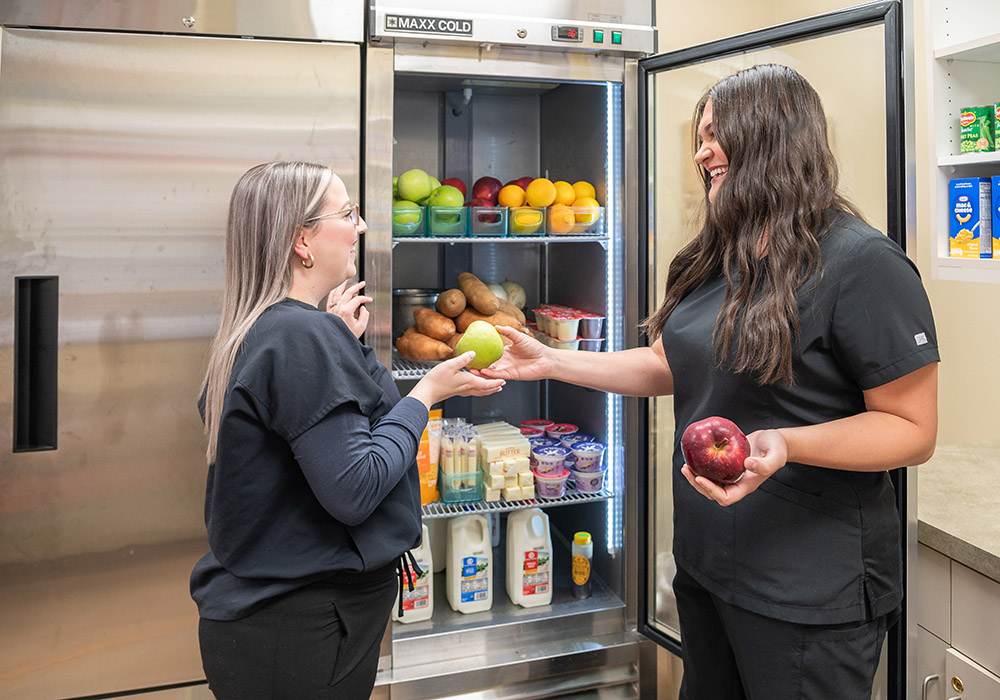Mary Bird Perkins Cancer Center is the largest cancer care organization in Louisiana, with 19 locations, including Covington, a New Orleans suburb with a growing population of just under 12,000. In 2020, Covington providers were seeing an increasing number of patients facing food insecurity and financial toxicities.
Logan Nicole Lack, BSN, RN, is a nurse navigator at the center. Part of her role is to build rapport with patients while gauging their social and emotional status. She talks with patients about their family history, living situations, current or recent employment, support systems, and appetite. That dialogue helps her assess patients’ food security status.
“Every patient encounter I have is unique, and it’s important for me to be mindful and empathetic and understand every part of their story,” Lack said. “Food insecurity is happening all around us. Whether that looks like running out of groceries before the end of the month, anxiety around having the money to purchase enough food, or the lack of nutrient-dense foods, every individual has a different story.”
When Lack has concerns about patients’ nutritional needs, she refers them to registered dietitian Meredith Bechac, MS, RD, LDN. Bechac was part of a team, including social workers, radiation therapists, infusion nurses, and nurse navigators, that developed the center’s therapeutic food pantry (TFP). She often works with Lack to provide patients with the personalized care and support they need.
“It is easy to become blinded by bias if you have never personally experienced food insecurity. You do not have to have experienced insecurity to be an advocate for your patients,” Lack said. “I encourage oncology nurses to lean on your team, lean on your center’s registered dietitians, and stay in the loop on community resources available to best mitigate barriers to care during a patient’s cancer journey.”
When patients arrive to a consult, Bechac has them complete a nutrition screening tool that asks them to select “never,” “sometimes,” or “always” to two prompts:
- I ran out of money to buy more food.
- The food I bought did not last.
Their responses help Bechac to identify those who might benefit from the TFP, but she says she also relies on infusion nursing staff to notify her if a patient becomes food insecure while under treatment or has continued nutrition needs. On a weekly basis, staff obtain anthropometrics and biochemical data from patients under active treatment.
“The diagnoses in patients I see most frequently are current or future complications to the gastrointestinal tract or absorption,” Bechac said. “As I monitor those patients weekly, I find that most are using the TFP and I can track their nutrition status through those metrics. Verbal feedback from patients, caregivers, and family members has been the best way to detect the TFP’s impact.”
The therapeutic aspect of the food pantry means that items are carefully curated to meet a patient's best needs during treatment. “For example, it has softer foods for a patient with a head and neck diagnosis, high protein foods for a patient with breast cancer, and appropriate fiber choices for those with colorectal diagnoses,” Bechac said.
The TFP started small, with a few shelf-stable items, fresh produce, dairy, cheese, and eggs. In 2020, the pantry had around 10–12 monthly visits. Today, it receives nearly 40–50 visits per month. To fill the need from that growth, the TFP established a partnership with Second Harvest Food Bank of Greater New Orleans and Acadiana that brings in an additional 2,000 pounds of food each month, including fresh produce, shelf-stable items, frozen proteins, prepared meals, and emergency boxes during hurricane season.
Patients can visit the TFP once a week while undergoing active cancer treatment at the center. Because the TFP is available whenever the cancer center is open, it helps remove potential barriers since the patient is already in the center for appointments. Community food pantries may be open only on certain days of the week or at certain times during food distribution days that may conflict with patients’ treatment appopintments.
In 2023, the food pantry had a total of 800 visits, serving more than 650 unique patients.
“People all around us are experiencing extreme financial toxicity, whether it be from a cancer diagnosis or other life events,” Bechac said. “The TFP is a safe space where all people are welcome, no matter what season of life they are struggling with to fill the gaps.”






